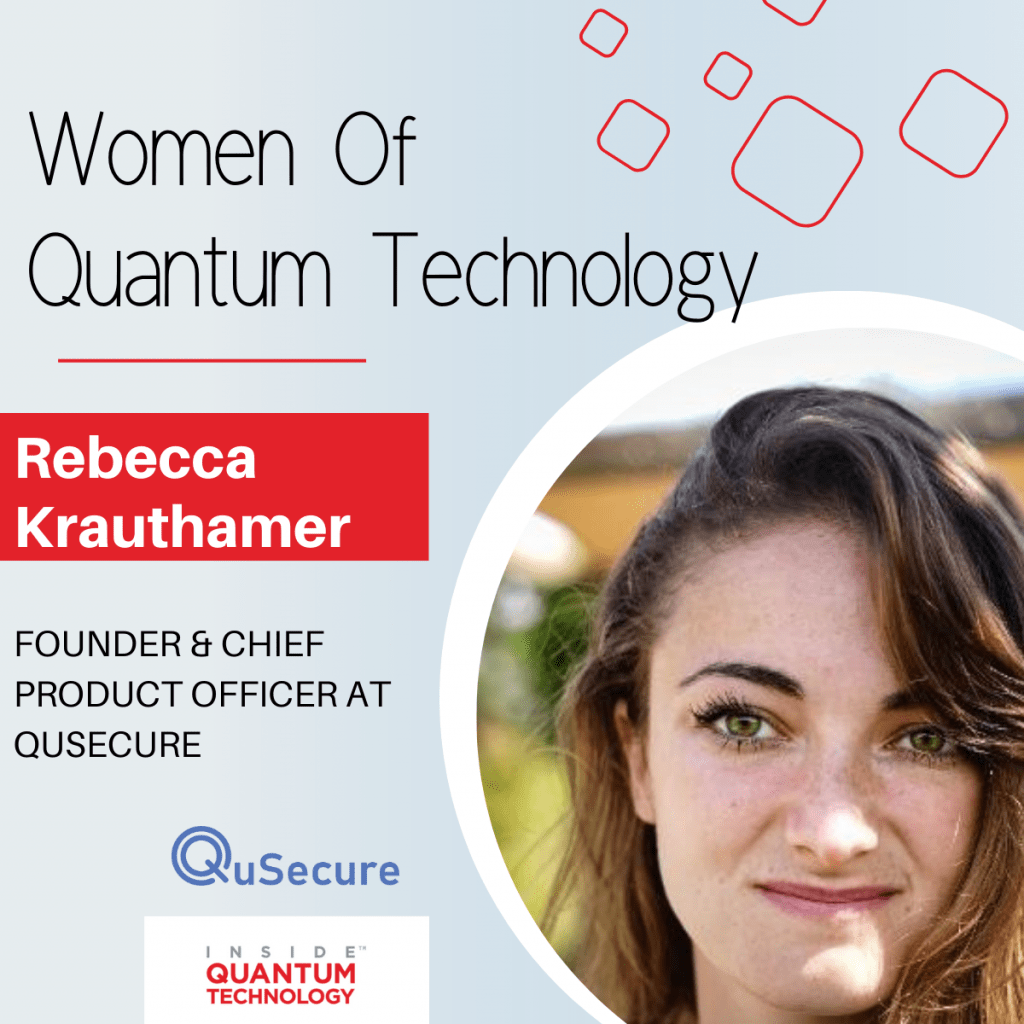While many individuals within the quantum industry were interested in quantum physics from a very young age, Rebecca Krauthamer, the founder and Chief Product Officer of the quantum company QuSecure, has her own unique story. “At a young age I had the privilege of working with Robin Williams in the movie Bicentennial Man,” Krauthamer explained. “It was a sci-fi comedy using robots based on Isaac Asimov’s novel The Positronic Man. I didn’t know what AI was then, but I came away thinking robots were pretty awesome! I was intrigued by the idea that we could build machines that thought and acted like people.” Krauthamer continued to pursue her interest in AI as she continued her education. As she added: “I went on to study symbolic systems in college – the study of machine learning and how we build systems that ‘think.’ After spending a few years on the implementation side of machine learning, I started to understand where our limitations lie in terms of today’s classical hardware.”
As the Chief Product Officer at QuSecure and a Forbes 30 Under 30 member, Krauthamer has shifted her focus toward quantum computing, though still looking at implementation. “For me, quantum computing represents the next frontier – a way to unlock so much of the potential of AI and technology broadly,” she said. “As tech becomes more and more intertwined with people’s lives, I spend a lot of time thinking about and working on what it means to build ethical technologies. We have an incredible opportunity while quantum is still in its early stages to build the foundations of the industry to be the most diverse, socially responsible, and human-empowering technology ecosystem yet.” With her work at the forefront of this developing technology, Krauthamer is able to see how this industry may shift and adapt over time to become more ethical and sustainable.
Even before starting QuSecure in 2019, Krauthamer was already interested in the ethical use of next-generation technology. “In 2018, I crossed paths with my now-cofounder of QuSecure Skip Sanzeri, who couldn’t stop talking about quantum computing,” she stated. “Once I learned about it, I knew I wanted to be part of the pioneering group that is setting the foundations for how the quantum ecosystem will develop.” With Sanzeri, Krauthamer developed the venture fund Quantum Thought, based in Silicon Valley. “The idea was to help build a bridge to commercial viability for the many brilliant ideas coming out of academia,” Krauthamer added. “What became clear was that the imperative we must get ahead of before anything else is solving for the threat quantum computers pose to today’s cybersecurity.” While working at Quantum Thought, both Krauthamer and Sanzeri decided it was time to create something new and different. What resulted was the leading quantum cybersecurity encryption company, QuSecure.
As the Founder and Chief Product Officer at QuSecure, Krauthamer is able to look at the implementations of cybersecurity using quantum computing. “I oversee the product direction for QuProtect, our post-quantum cybersecurity platform,” Krauthamer stated. “My work involves determining how we continue to shape the product based on market demands, customer feedback and adoption, technical feasibility, and vision for where the cybersecurity industry will end up in the next few years.” As many experts predict that cybersecurity will be both a large industry for quantum computing usage, but also be threatened by quantum computing, understanding these relationships will be essential for a safer digital future. As an expert in this field, Krauthamer understands these stakes. “Ultimately, I work to ensure that QuSecure’s products continue to innovate and are compelling in an emerging and evolving market,” she added. “I get to work with some of the smartest people in the world every day. As a new field, the quantum resilience ecosystem is incredibly exciting because in many ways my team and I get to help shape how it develops.”
With her leadership position at QuSecure, Krauthamer also realizes that she can help to make this industry and ecosystem more inclusive for other women and minority groups. “There are so many reasons to invest in diversity,” she explained. “Study after study shows that companies that are more diverse are more successful. When we think about creating a better future through technology, it’s critical that the people building the technology represent the broad array of experiences of the people the technology is meant to serve.” However, there are challenges to making this diversity happen. As she explained: “The first is hiring and building diverse teams today. For hiring today, implementing flexible work hours and other family-friendly rules can help increase the industry’s appeal to a wider range of prospective employees from various backgrounds. Actively fostering and promoting diverse leadership within the company in turn attracts more diverse talent. The second is improving the pipeline for the future, and this has to start earlier in the education system. In terms of building a stronger pipeline, early education and helping people find programs and mentorship is important. There are a number of great funding programs and educational activities for underrepresented groups, such as training courses or scholarships. It often takes more effort to hire a diverse team, but it’s always worth it.”
Kenna Hughes-Castleberry is a staff writer at Inside Quantum Technology and the Science Communicator at JILA (a partnership between the University of Colorado Boulder and NIST). Her writing beats include deep tech, quantum computing, and AI. Her work has been featured in Scientific American, New Scientist, Discover Magazine, Ars Technica, and more.
